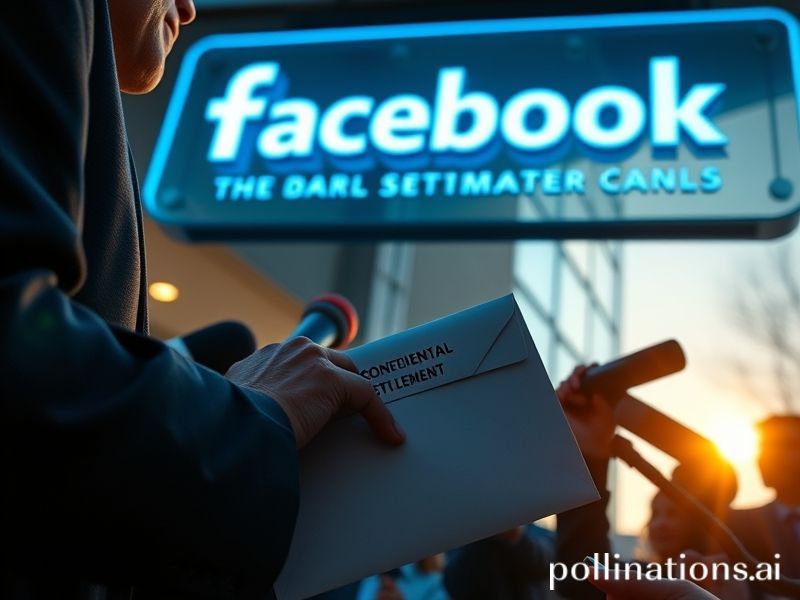Facebook’s $725M Privacy Payout: Global Schadenfreude & the $30 Apology Tour
Facebook’s $725 Million Privacy Settlement: A Global Receipt for Twenty Years of Oversharing
By Our Correspondent, Somewhere with Better Wi-Fi Than You
Mark Zuckerberg’s legal team finally found the “download receipt” button—except instead of a PDF, it’s a $725 million class-action settlement, and instead of a printer, it’s wired directly to the 250 million Americans who once believed that “likes” were free. The payout, rubber-stamped in a California courtroom last week, is being heralded as the largest privacy settlement in U.S. history, which is a bit like being named “least radioactive” at Chernobyl: technically an achievement, contextually alarming.
Internationally, the figure lands with the soft thud of pocket change. Seven hundred and twenty-five million dollars is roughly what Meta earns every four days from the rest of us doom-scrolling, or what the EU spends on paper clips before elevenses. Yet in the grand bazaar of global data scandals, it still counts as hard currency. South Koreans, who watched their own KakaoTalk breach skate by with a regulatory shrug, now have fresh ammunition for their “at least we’re not Facebook” coffee-mug slogans. Brazilians who endured WhatsApp shutdowns over data-sharing tiffs can finally update their group-chat gifs to a dancing dollar sign. And in Nigeria, where mobile-money fraud makes Facebook’s Cambridge Analytica episode look quaint, the settlement is being parsed by fintech CEOs wondering if they, too, can monetize remorse.
Europeans, ever the connoisseurs of American tech penance, greeted the news with the kind of polite applause usually reserved for a mediocre opera. “It’s a start,” said Margrethe Vestager, the EU’s competition tsarina, while already drafting the next antitrust fine large enough to fund three Baltic navies. Brussels insiders joke that Meta’s legal reserves now exceed the GDP of several EU candidate countries—an irony not lost on Moldovan diplomats who note their entire national budget could be underwritten by Zuckerberg’s parking-ticket jar.
Meanwhile, in authoritarian corners of the map, the settlement is being weaponized in PowerPoint. Beijing’s censors gleefully cite the payout as evidence that “unfettered capitalism harvests its own citizens,” just before harvesting their own citizens’ data with marginally better opacity. Tehran’s state TV ran a segment titled “Facebook Pays Americans, Ignores Persian Blood,” neatly ignoring that Telegram remains the government’s preferred honeypot. It’s a peculiar form of Cold War déjà vu: instead of nukes, superpowers now compete over whose privacy abuse comes with a rebate coupon.
The mechanics of disbursement are where the farce meets the fine print. Qualifying users—anyone who held a Facebook account between May 2007 and December 2022—can submit a claim online, provided they remember which burner email they used in ninth grade and can solve CAPTCHA images that appear designed by a sadistic optometrist. Payout estimates hover around $30 per claimant, or roughly the price of a mediocre avocado toast in Sydney, a single ride on the London Underground, or three cigarettes in Oslo. International observers note this is still more generous than Equifax’s 2019 settlement, where victims received the digital equivalent of a shrug emoji.
What the settlement doesn’t cover is the psychic rent Facebook still collects: the familial Thanksgivings ruined by QAnon uncles, the high-school friendships curdled by vacation-photo envy, the entire nation of Myanmar. Those damages remain non-pecuniary and therefore, in legal parlance, “tough cookies.”
Yet the ripple effects are real. India’s parliament is already citing the case to fast-track its own data-protection bill—though local critics suspect the law will protect the ruling party’s data more assiduously than yours. Australia’s ACCC is sharpening its “bargaining code” knives, eager to carve out similar tribute from Google before it, too, discovers the magic of pre-emptive contrition. And in Kenya, digital-rights advocates are translating the settlement notice into Swahili, just in case Meta’s next market expansion comes with remorse pre-installed.
At the bottom of the claim form, in six-point gray font, users must affirm they “release Meta from any future privacy claims.” It’s the corporate equivalent of slipping a twenty across the bar and whispering, “This never happened.” Globally, we pocket the twenty, open another tab, and keep scrolling—because in the attention economy, the only thing more infinite than human gullibility is the next notification. And somewhere in Menlo Park, a product manager is already A/B testing how much more we’ll forgive in 2025.







